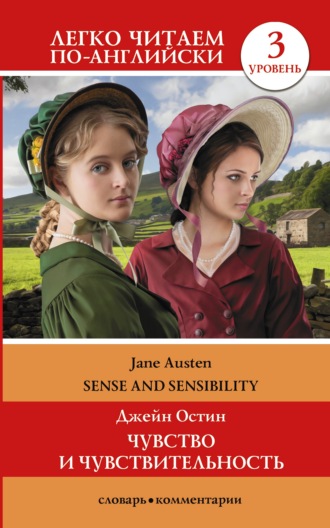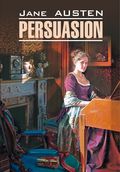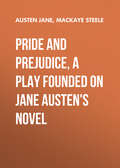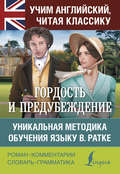
Джейн Остин
Sense and Sensibility / Чувство и чувствительность. Уровень 3
Chapter VIII
Mrs. Jennings was a widow. She had only two daughters, both of whom were respectably married, and she had now therefore nothing to do but to marry all the rest of the world. In the promotion of this object she was zealously active. She was remarkably quick in the discovery of attachments. It enabled her soon after her arrival at Barton to pronounce that Colonel Brandon was very much in love with Marianne Dashwood. It must be so. She was perfectly convinced of it. It will be an excellent match, for he is rich, and she is handsome. Mrs. Jennings was anxious to see Colonel Brandon well married since she met him.
This idea supplied her with endless jokes against them both. At the park she laughed at the colonel, and in the cottage at Marianne, who hardly knew whether to laugh, or to censure it.
Mrs. Dashwood, who did not think a man five years younger than herself, ventured to clear Mrs. Jennings from the probability of wishing to throw ridicule on his age.
“But at least, Mama, you cannot deny the absurdity of the accusation, though you may not think it intentionally ill-natured. Colonel Brandon is certainly younger than Mrs. Jennings, but he is old enough to be my father. It is ridiculous! And I suspect infirmity.”
“Infirmity!” said Elinor, “do you call Colonel Brandon infirm? I can easily suppose that his age may appear much greater to you than to my mother; but he uses his limbs very well!”
“Did not you hear him complain of the rheumatism? Is not that the sign of infirmity?”
“My dearest child,” said her mother, laughing, “at this rate you must be in continual terror of my death. It must seem to you a miracle that my life has been extended to the age of forty.”
“Mama, I know very well that Colonel Brandon is not old enough to die. He may live twenty years longer. But thirty-five has nothing to do with matrimony.”
“Perhaps,” said Elinor, “thirty-five and seventeen have nothing to do with matrimony together. But if there is a woman who is single at seven and twenty, Colonel Brandon can marry her for sure.”
“A woman of seven and twenty,” said Marianne, after pausing a moment, “can never hope to feel or inspire affection. In my eyes it will be no marriage at all, to me it will seem only a commercial exchange[5].”
“It is impossible, I know,” replied Elinor, “to convince you that a woman of seven and twenty can feel something for a man of thirty-five. But I must object to your dooming Colonel Brandon and his wife to the hospital, merely because he complained yesterday (a very cold damp day) of a slight rheumatic feel in one of his shoulders.”
Soon after this, upon Elinor’s leaving the room, “Mama,” said Marianne, “I have an alarm on the subject of illness which I cannot conceal from you. I am sure Edward Ferrars is not well. We have now been here almost a fortnight, and yet he does not come. He is ill. What else can detain him at Norland?”
“Had you any idea of his coming so soon?” said Mrs. Dashwood. “I had none. On the contrary, he did not show pleasure or readiness in accepting my invitation, when I talked of his coming to Barton. Does Elinor expect him already?”
“I have never mentioned it to her, but of course she must.”
“I think you are mistaken. Yesterday I offered her to get a new grate for the spare bedchamber, and she observed that there was no immediate hurry for it. It is not likely that the room will be wanted for some time.”
“How strange this is! What can be the meaning of it! How cold, how composed were their last adieus! How languid their conversation the last evening! In Edward’s farewell there was no distinction between Elinor and me: it was the good wishes of an affectionate brother to both. Twice I left them purposely together, and each time he followed me out of the room. And Elinor, quitting Norland and Edward, did not cry as I did. Even now her self-command is invariable. Where is her melancholy? When does she try to avoid society, or appear restless and dissatisfied in it?”
Chapter IX
The Dashwoods were now settled at Barton with tolerable comfort to themselves. The house and the garden, with all the objects surrounding them, now became familiar. Sir John Middleton could not conceal his amazement on finding them always employed.
Their visitors, except those from Barton Park, were not many. The high downs which invited them from almost every window of the cottage to seek the exquisite enjoyment of air on their summits, were a happy alternative. Towards one of these hills Marianne and Margaret one memorable morning directed their steps, attracted by the partial sunshine of a showery sky.
They gaily ascended the downs; and when they caught in their faces the gales of a high south-westerly wind, they pitied the fears which had prevented their mother and Elinor from sharing such delightful sensations.
“Is there a felicity in the world,” said Marianne, “superior to this? – Margaret, we will walk here at least two hours.”
Margaret agreed, and they pursued their way against the wind, when suddenly the clouds united over their heads, and a driving rain set full in their face. Dissapointed and surprised, they were obliged to turn back, for no shelter was nearer than their own house.
They began to run. A false step brought Marianne suddenly to the ground; and Margaret, unable to stop herself to assist her, reached the bottom in safety.
A gentleman carrying a gun, with two pointers playing round him, was passing up the hill and within a few yards of Marianne, when her accident happened. He put down his gun and ran to her assistance. She had raised herself from the ground, but she was scarcely able to stand. The gentleman offered his services; and took her up in his arms without farther delay, and carried her down the hill. Then he bore her directly into the house, and seated her in a chair in the parlour. Elinor and her mother rose up in amazement at their entrance. While the eyes of both were fixed on him with an evident wonder and a secret admiration, he apologized for his intrusion, in a manner so frank and so graceful that his person received additional charms from his voice and expression. The influence of youth, beauty, and elegance gave an interest to the action which Mrs. Dashwood saw.
She thanked him again and again; and invited him to be seated. But this he declined, as he was dirty and wet. Mrs. Dashwood then begged to know to whom she was obliged. His name, he replied, was Willoughby, and his present home was at Allenham. He hopes she will allow him to visit Miss Dashwood tomorrow. The honour was readily granted, and he then departed, to make himself still more interesting, in the midst of a heavy rain.
His manly beauty and gracefulness were instantly the theme of general admiration. He was a real hero in Marianne’s eyes. His name was good, his residence was in their favourite village, and she soon found out that of all manly dresses a shooting-jacket was the most becoming.
Sir John called on them[6] soon. Marianne’s accident was related to him, and he was asked whether he knew any gentleman of the name of Willoughby at Allenham.
“Willoughby!” cried Sir John; “That is good news; I will ride over tomorrow, and ask him to dinner on Thursday.”
“You know him then,” said Mrs. Dashwood.
“Know him! to be sure I do. He domes here every year.”
“And what sort of a young man is he?”
“A very good fellow, I assure you. An excellent hunter, and the best rider in England.”
“And is that all you can say?” cried Marianne, indignantly. “What are his manners? What are his pursuits, his talents, and genius?”
Sir John was rather puzzled.
“You know,” said he, “I do not know much about him. But he is a pleasant, good-humoured fellow, and has got the nicest pointer I ever saw. Was it with him?”
But Marianne could no tell about Mr. Willoughby’s pointer.
“But who is he?” said Elinor. “Where does he come from? Has he a house at Allenham?”
Sir John told them that Mr. Willoughby had no property of his own in the country. He resided there only while he was visiting the old lady at Allenham Court, to whom he was related, and whose possessions he was to inherit; adding,
“Yes, yes, he is very well worth catching[7] I can tell you, Miss Dashwood. He has a pretty little estate of his own in Somersetshire besides. Miss Marianne must not expect to have all the men to herself. Brandon will be jealous, if she does not take care[8].”
“I do not believe,” said Mrs. Dashwood, with a smile, “that my daughters will try to catch Mr. Willoughby. Men are very safe with us, let them be ever so rich. I am glad to find, however, from what you say, that he is a respectable young man, and one whose acquaintance will not be ineligible.”
“He is a good fellow, I believe,” repeated Sir John. “I remember last Christmas he danced from eight o’clock till four.”
“Did he indeed?” cried Marianne with sparkling eyes, “and with elegance, with spirit?”
“Yes; and he was up again at eight to go hunting.”
“That is what I like; that is what a young man ought to be!”
“I see,” said Sir John, “You are interested in him now, and you will never think of poor Brandon.”
“That is an expression, Sir John,” said Marianne, warmly, “which I particularly dislike. It is gross and illiberal.”
Sir John laughed heartily, and then replied,
“Poor Brandon! He is in love already, and he is very well worth catching, too, I can tell you.”
Chapter X
Marianne’s preserver, as Margaret named Willoughby, called at the cottage early the next morning to make his personal enquiries. He was received by Mrs. Dashwood with politeness. Everything during the visit tended to assure him of the sense, elegance, mutual affection, and domestic comfort of the family to whom accident had now introduced him.
Miss Dashwood had a delicate complexion, regular features, and a remarkably pretty figure. Marianne was still handsomer. Her form was more striking; and her face was lovely. Her skin was very brown, but her complexion was uncommonly brilliant. Her features were all good; her smile was sweet and attractive; and in her eyes, which were very dark, there was a life, a spirit, an eagerness.
It was only necessary to mention any favourite amusement to engage her to talk. She could not be silent, and she had neither shyness nor reserve. They speedily discovered that their enjoyment of dancing and music was mutual. She proceeded to question him on the subject of books. Their taste was strikingly alike. The same books, the same passages were idolized by each.
“Well, Marianne,” said Elinor, as soon as he had left them, “for one morning I think you have done pretty well. You have already ascertained Mr. Willoughby’s opinion in almost everything. You know what he thinks of Cowper and Scott. But you will soon have exhausted each favourite topic. Another meeting will suffice to explain his sentiments, and then you can have nothing farther to ask.”
“Elinor,” cried Marianne, “are my ideas so scanty? But I see what you mean. I have been too happy, too frank. I have been open and sincere where I ought to be reserved, spiritless, dull, and deceitful.”
“My love,” said her mother, “you must not be offended with Elinor – she was only in jest[9].”
Marianne was softened in a moment.
Willoughby, on his side, came to them every day. To enquire after Marianne was at first his excuse, but the encouragement of his reception made such an excuse unnecessary. Willoughby was a young man of good abilities, quick imagination, lively spirits, and open, affectionate manners. He was exactly formed to engage Marianne’s heart.
His society became gradually her most exquisite enjoyment. They read, they talked, they sang together; his musical talents were considerable; and he read with the sensibility and spirit.
In Mrs. Dashwood’s estimation he was as faultless as in Marianne’s; and Elinor saw nothing to censure in him.
Her mother expected their marriage; and secretly congratulated herself on two such sons-in-law as Edward and Willoughby.
Colonel Brandon’s partiality for Marianne now became perceptible to Elinor. Elinor was obliged, though unwillingly, to believe that the sentiments which Mrs. Jennings had assigned him, were now actually excited by her sister. She liked him – in spite of his gravity and reserve, she beheld in him an object of interest. His manners, though serious, were mild. Perhaps she pitied and esteemed him because Willoughby and Marianne undervalued his merits.
“Brandon is just the kind of man,” said Willoughby one day, when they were talking of him together, “whom everybody speaks well of, and nobody cares about.”
“That is exactly what I think of him,” cried Marianne.
“However,” said Elinor, “it is injustice. He is highly esteemed by all the family at the park, and I like to converse with him.”
“That he is patronised by you,” replied Willoughby, “is certainly in his favour; but as for the esteem of the others, it is a reproach. In defence of your protégé you can even be saucy.”
“My protégé, as you call him, is a sensible man; and sense will always have attractions for me. Yes, Marianne, even in a man between thirty and forty. He has seen much; has been abroad, has read, and has a thinking mind. He is capable of giving me much information on various subjects; and he has always answered my inquiries with readiness of good nature.”
“That is to say,” cried Marianne contemptuously, “he has told you, that in the East Indies the climate is hot, and the mosquitoes are troublesome.”
“Perhaps,” said Willoughby, “his observations may extend to the existence of nabobs and palanquins.”
“Why do you dislike him?” asked Elinor.
“I do not dislike him. I consider him, on the contrary, as a very respectable man, who has more money than he can spend, more time than he knows how to employ, and two new coats every year.”
“And,” cried Marianne, “he has neither genius, taste, nor spirit. His understanding has no brilliancy, his feelings no ardour, and his voice no expression.”
“I can only say,” replied Elinor, “that he is a sensible man, well-bred, well-informed, and, I believe, possessing an amiable heart.”
“Miss Dashwood,” cried Willoughby, “I have three reasons for disliking Colonel Brandon. He threatened me with rain when I wanted it to be fine. He has found fault with my curricle. And I cannot persuade him to buy my brown mare. However, his character in other respects is irreproachable, I am ready to confess it.”
Chapter XI
When Marianne was recovered, the private balls at the park began. The parties on the water were made and accomplished as often as a showery October allowed. In every meeting Willoughby was included.
Elinor was not surprised at their attachment. She only wished it was less openly shown. Marianne abhorred all concealment. Willoughby thought the same; and their behaviour at all times, was an illustration of their opinions.
When he was present she did not see anyone else. Everything he did, was right. Everything he said, was clever. If their evenings at the park were concluded with cards, he cheated himself and all the rest of the party to let her win. If dancing formed the amusement of the night, they were partners for half the time. The people laughed at them; but ridicule could not shame and provoke them. To Mrs. Dashwood it was but the natural consequence of a strong affection in a young and ardent mind.
This was the season of happiness to Marianne. Her heart was devoted to Willoughby.
Elinor’s happiness was not so great. Her heart was not so much at ease. Neither Lady Middleton nor Mrs. Jennings were her friends; although the latter was an everlasting talker. Lady Middleton was more agreeable than her mother because she was more silent. But Elinor perceived that her reserve was a mere calmness of manner. Towards her husband and mother she was the same as to them. She had nothing to say one day that she had not said the day before.
In Colonel Brandon alone, of all her new acquaintance, did Elinor find an interesting person. He excited the interest of friendship, and gave pleasure as a companion. Willoughby was out of the question. His attentions were wholly Marianne’s. Colonel Brandon, unfortunately for himself, did not think only of Marianne. In conversing with Elinor he found the greatest consolation for the indifference of her sister.
Elinor’s compassion for him increased, as she had reason to suspect that he knew misery of disappointed love[10]. This suspicion was given by some words which accidentally dropped from him one evening at the park, when they were sitting down together, while the others were dancing. His eyes were fixed on Marianne, and, after a silence of some minutes, he said, with a faint smile,
“Your sister, I understand, does not approve of second attachments.”
“No,” replied Elinor, “she is very romantic.”
“Or rather, as I believe, she considers them impossible to exist.”
“I believe she does. But her own father had himself two wives. It’s strange.”
After a short pause he resumed the conversation,
“Does your sister make no distinction in her objections against a second attachment? Or is it equally criminal in everybody? Must those who were disappointed in their first choice, be equally indifferent during the rest of their lives?”
“I am not acquainted with her principles. I only know she does not admit the second attachment. It’s not pardonable.”
“This,” said he, “cannot last long; but a change, a total change of sentiments – no, no, do not desire it. I speak from experience. I once knew a lady who greatly resembled your sister, who thought and judged like her, but who – from a series of unfortunate circumstances – ”
Here he stopped suddenly.
Chapter XII
One day Margaret cried,
“Oh, Elinor! I have such a secret to tell you about Marianne. I am sure she will be married to Mr. Willoughby very soon.”
“You have said so,” replied Elinor, “almost every day since they first met.”
“But indeed this is quite another thing. I am sure they will be married very soon, for he has got a lock of her hair[11]. He cut it off. I saw it! Last night after tea, when you and mama went out of the room, they were whispering and talking together. Then he begged something of her, and took up her scissors and cut off a long lock of her hair. And he kissed it, and folded it up in a piece of white paper; and put it into his pocket-book.”
Margaret’s sagacity was not always satisfactory to her sister. When Mrs. Jennings attacked her one evening at the park, to give the name of the young man who was Elinor’s particular favourite – it was a matter of great curiosity to her, – Margaret said, “I must not tell, right, Elinor?”
This of course made everybody laugh; and Elinor tried to laugh too. But the effort was painful. She did not like Mrs. Jennings’s jokes.
Marianne turned red and said in an angry manner to Margaret,
“Remember that you have no right to repeat your conjectures.”
“I never had any conjectures about it,” replied Margaret; “it was you who told me of it yourself.”
This increased the mirth of the company.
“Oh! Miss Margaret, let us know all about it,” said Mrs. Jennings. “What is the gentleman’s name?”
“I must not tell, ma’am. But I know very well what it is; and I know where he is too.”
“Yes, yes, we can guess where he is; at his own house at Norland to be sure. He is the curate of the parish I dare say.”
“No, that he is not.”
“Margaret,” said Marianne, “you know that all this is an invention of your own, and that there is no such person in existence.”
“Well, then, he is lately dead, Marianne, for I am sure there was such a man once, and his name begins with an F.”
Lady Middleton observed, at this moment, “that it rained very hard”. The idea was immediately pursued by Colonel Brandon. Willoughby opened the piano-forte, and asked Marianne to sit down to it.
A party was formed this evening for going on the following day to see a very fine place about twelve miles from Barton. It belonged to a brother-in-law of Colonel Brandon, who was then abroad.
To somebody it appeared rather a bold undertaking, considering the time of year, and that it had rained everyday for the last fortnight. Elinor persuaded Mrs. Dashwood, who had already a cold, to stay at home.





